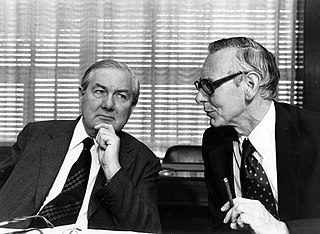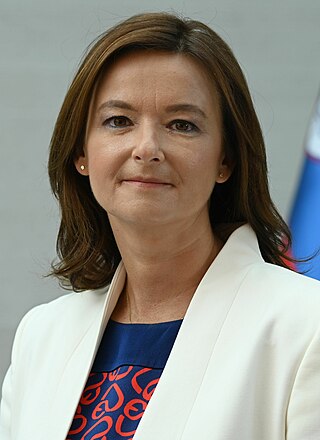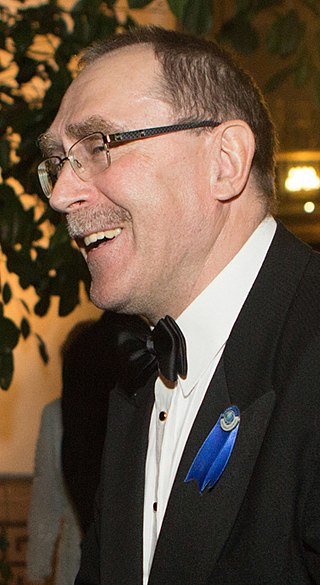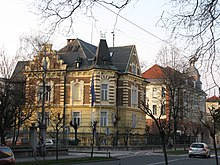
In many countries, the ministry of foreign affairs is the highest government department exclusively or primarily responsible for the state's foreign policy and relations, diplomacy, bilateral, and multilateral relations affairs as well as for providing support for a country's citizens who are abroad. The entity is usually headed by a foreign minister or minister of foreign affairs. The foreign minister typically reports to the head of government.

The Ministry of Foreign Affairs is an executive department of the Government of Japan, and is responsible for the country's foreign policy and international relations.
The Royal Norwegian Ministry of Foreign Affairs is the foreign ministry of the Kingdom of Norway. It was established on June 7, 1905, the same day the Parliament of Norway (Storting) decided to dissolve the personal union with Sweden.

The Ministry of Foreign Affairs, European Union and Cooperation (MAEUEC) is a department of the Government of Spain in charge of planning, managing, carrying out and evaluating the country's foreign and international cooperation for development policies, paying special attention to the ones in relation to the European Union and Ibero-America, as well as coordinating and supervising all actions done in this areas by the other Ministries and Public Administrations. Likewise, it is responsible for promoting international economic, cultural and scientific relationships, taking part in the proposal and application of the migration policy, promoting cross-border and interterritorial cooperation, protecting Spaniards abroad and preparing, negotiating and processing the international treaties which Spain is part of.

The Ministry of Foreign Affairs is the Netherlands' ministry responsible for foreign relations, foreign policy, international development, international trade, diaspora and matters dealing with the European Union, NATO and the Benelux Union. The ministry was created in 1798, as the Department of Foreign Affairs of the Batavian Republic. In 1876, it became the Ministry of Foreign Affairs.

The Ministry of Foreign Affairs, officially the Ministry of Foreign Affairs of the Republic of China, is a cabinet-level ministry in the government of Taiwan. It is headquartered in the capital Taipei. The incumbent minister is Joseph Wu, who took office in 2018 and is affiliated with the Democratic Progressive Party.

Ministry of Foreign Affairs of Azerbaijan is a Cabinet-level governmental agency of Azerbaijan Republic in charge of conducting and designing the country's foreign policy.

The Ministry of Foreign Affairs of the Republic of Serbia is the ministry in the government of Serbia which is in the charge of maintaining the consular affairs and foreign relations of Serbia. The current minister is Marko Đurić, in office since 26 October 2022.

The Ministry of Foreign Affairs, abbreviated KLN, is a ministry of the Government of Malaysia that is responsible for foreign affairs, Malaysian diaspora, foreigners in Malaysia, diplomacy, foreign relations, counter terrorism, bilateral affairs, multilateral affairs, ASEAN, international protocol, consular services, maritime affairs, and chemical weapons. It is currently based in Putrajaya. It is also widely known as Wisma Putra, which is also the name of its building in Putrajaya.

The Ministry of Foreign Affairs, is the Portuguese governmental department responsible for the formulation, coordination, and execution of the foreign policy. The Ministry has its headquarters in the Palácio das Necessidades, in Lisbon. Its current head is the Minister of State and of Foreign Affairs, Paulo Rangel. There are three Secretaries of State which are part of the Ministry: European Affairs; Foreign Affairs and Cooperation; and Portuguese Communities.

The Ministry of Defence of the Republic of Slovenia is a ministry of the Republic of Slovenia, in charge of Slovenia's defence against external enemies and natural disasters.

The Ministry of Foreign Affairs of the Republic of Indonesia or commonly known by its abbreviation Kemlu, is an Indonesian government ministry responsible for the country's foreign politics and diplomacy. The ministry was formerly known as the Department of Foreign Affairs until 2008 when the nomenclature changed with the enactment of the 2008 State Ministry Act.

The Ministry of Foreign Affairs of Tunisia is a cabinet-level governmental agency in Tunisia in charge of conducting and designing the foreign policy of the country.

The Secretary of State for the European Union (SEUE) is a senior official of the Ministry of Foreign Affairs, European Union and Cooperation of the Government of Spain. The SEUE is appointed by the Monarch with the advice of the Foreign Minister.

The Secretary of State for Foreign and Global Affairs (SEAEX) is a senior minister of the Ministry of Foreign Affairs, European Union and Cooperation of the Government of Spain. Although he or she has the same rank as the other Secretaries of State of the Department, the SEAEX is considered the second-in-command to the Minister.
The Secretary of State for Global Spain (SEEG) was a senior minister of the Ministry of Foreign Affairs, European Union and Cooperation of the Kingdom of Spain. It was directly responsible of the strategic design of Spain's foreign policy and external action. This involved, among other things, defining the key strategic lines of action, boosting and coordinating Spain's economic and public diplomacy, defending and promoting the image and international reputation of the country, and being in charge of the Ministry's communications. All of this occurred with the support of the rest of the Ministry's bodies and institutions that were linked to it such as the network of Casas, the Fundaciones Consejo or other analogous entities.

The minister of foreign affairs of the Republic of Slovenia is a senior official of the Government of Slovenia, and head of the Ministry of Foreign Affairs. They are, together with the prime minister and president of the Republic, responsible for foreign policy and international relations of the Republic Slovenia.

The Cabinet of the Prime Minister's Office, officially Cabinet of the Presidency of the Government, is a political and technical assistance body at the service of the Prime Minister of Spain. The Cabinet of the Prime Minister is composed of multiple departments directly responsible to the Premier and coordinated by the Chief of Staff. The Cabinet Office, the officials that work on it, their offices and the departments make up the Office of the Prime Minister.

Božo Cerar is a Slovenian former diplomat.

Central 5, also Central Five (C5), is an informal political cooperation between Austria, the Czech Republic, Hungary, Slovakia, and Slovenia that began in 2020. It is organised in the format of ministers responsible for foreign affairs. The group was initiated by the Austrian Foreign Minister Alexander Schallenberg.




















